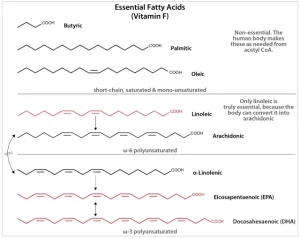
Vitamin F, often overlooked in discussions about essential nutrients, encompasses two vital fatty acids: alpha-linolenic acid (ALA) and linoleic acid (LA). These fatty acids are classified as essential because the body cannot synthesize them; they must be obtained through diet. From a fitness and health perspective, vitamin F offers a multitude of benefits that can enhance overall well-being, support athletic performance, and promote long-term health.
One of the primary advantages of vitamin F is its role in maintaining cellular structure and function. ALA and LA are crucial components of cell membranes, providing both flexibility and integrity. This structural support is essential for the proper functioning of all cells in the body, including muscle cells. For athletes and fitness enthusiasts, optimal cellular function translates to improved performance during workouts and quicker recovery afterward. When cells are healthy and functioning correctly, athletes can train harder, push their limits, and ultimately achieve their fitness goals more effectively.
Moreover, vitamin F plays a significant role in regulating inflammation within the body. Chronic inflammation can hinder athletic performance and recovery, leading to fatigue and increased risk of injury. The anti-inflammatory properties of ALA and LA can help mitigate these effects. By incorporating foods rich in vitamin F into their diets—such as nuts, seeds, and fatty fish—individuals can reduce inflammation levels, allowing for more effective training sessions and faster recovery times. This is particularly beneficial for those engaged in high-intensity sports or activities that place significant stress on the body.
In addition to its anti-inflammatory benefits, vitamin F is essential for cardiovascular health. A diet rich in omega-3 (ALA) and omega-6 (LA) fatty acids has been associated with improved heart health. These fatty acids help lower bad cholesterol levels while increasing good cholesterol levels, promoting better circulation and reducing the risk of heart disease. For athletes, maintaining a healthy cardiovascular system is crucial for endurance and overall performance. Improved blood flow means that muscles receive more oxygen and nutrients during exercise, enhancing stamina and reducing fatigue.
Vitamin F also supports brain health, which is vital for anyone engaged in physical activity. The brain relies heavily on fatty acids for optimal function; they are integral to building brain cell membranes and facilitating communication between neurons. Adequate intake of ALA and LA has been linked to improved cognitive function, memory retention, and overall mental clarity. For athletes, mental sharpness can be just as important as physical prowess; it influences focus during training sessions and competitions. By ensuring sufficient vitamin F intake, individuals can enhance both their physical performance and cognitive abilities.
Furthermore, vitamin F plays a role in skin health by contributing to hydration and barrier function. The fatty acids found in vitamin F help maintain the skin’s moisture balance and protect against environmental stressors. For active individuals who spend time outdoors or engage in strenuous activities that may lead to skin irritation or dryness, adequate vitamin F can support skin integrity. Healthy skin not only looks good but also serves as a protective barrier against pathogens and other harmful substances.
For those focused on weight management or fat loss, vitamin F can be an advantageous addition to their diet. Foods rich in essential fatty acids are often nutrient-dense yet satiating, helping individuals feel full while consuming fewer calories. This can aid in appetite control and promote healthier eating habits without feeling deprived. Additionally, replacing saturated fats with unsaturated fats like those found in vitamin F can contribute to better overall health outcomes.
Incorporating vitamin F into one’s diet is relatively simple due to its presence in various delicious foods. Sources of ALA include flaxseeds, chia seeds, walnuts, and leafy green vegetables like spinach. Linoleic acid is commonly found in vegetable oils such as sunflower oil, safflower oil, and corn oil, as well as nuts and seeds. By including a variety of these foods in daily meals, individuals can easily meet their nutritional needs while enjoying flavorful dishes.
While obtaining vitamin F through food sources is generally safe for most people, some individuals may consider supplementation if they have specific dietary restrictions or health conditions that limit their intake of these essential fatty acids. However, it is advisable to consult with healthcare professionals before starting any new supplement regimen to ensure safety and appropriateness.
In conclusion, vitamin F is a vital nutrient that offers numerous benefits for health and fitness enthusiasts alike. Its contributions to cellular integrity, inflammation regulation, cardiovascular health, brain function, skin health, and weight management highlight its importance in supporting an active lifestyle. By prioritizing adequate intake of ALA and LA through a balanced diet rich in whole foods or considering supplementation when necessary, individuals can harness the potential benefits of vitamin F to enhance their physical performance while promoting long-term well-being. Embracing this powerful nutrient as part of a comprehensive approach to health will empower individuals on their journey toward achieving optimal fitness while fostering resilience against illness and injury. With proper attention to vitamin F status, athletes and fitness enthusiasts alike can unlock new levels of potential in their physical endeavors while enjoying lasting health benefits that contribute to an active lifestyle.
Need your own dietary supplement manufacturer? Extremely competitive rates. We produce it all. Talk to us.
Comments are closed